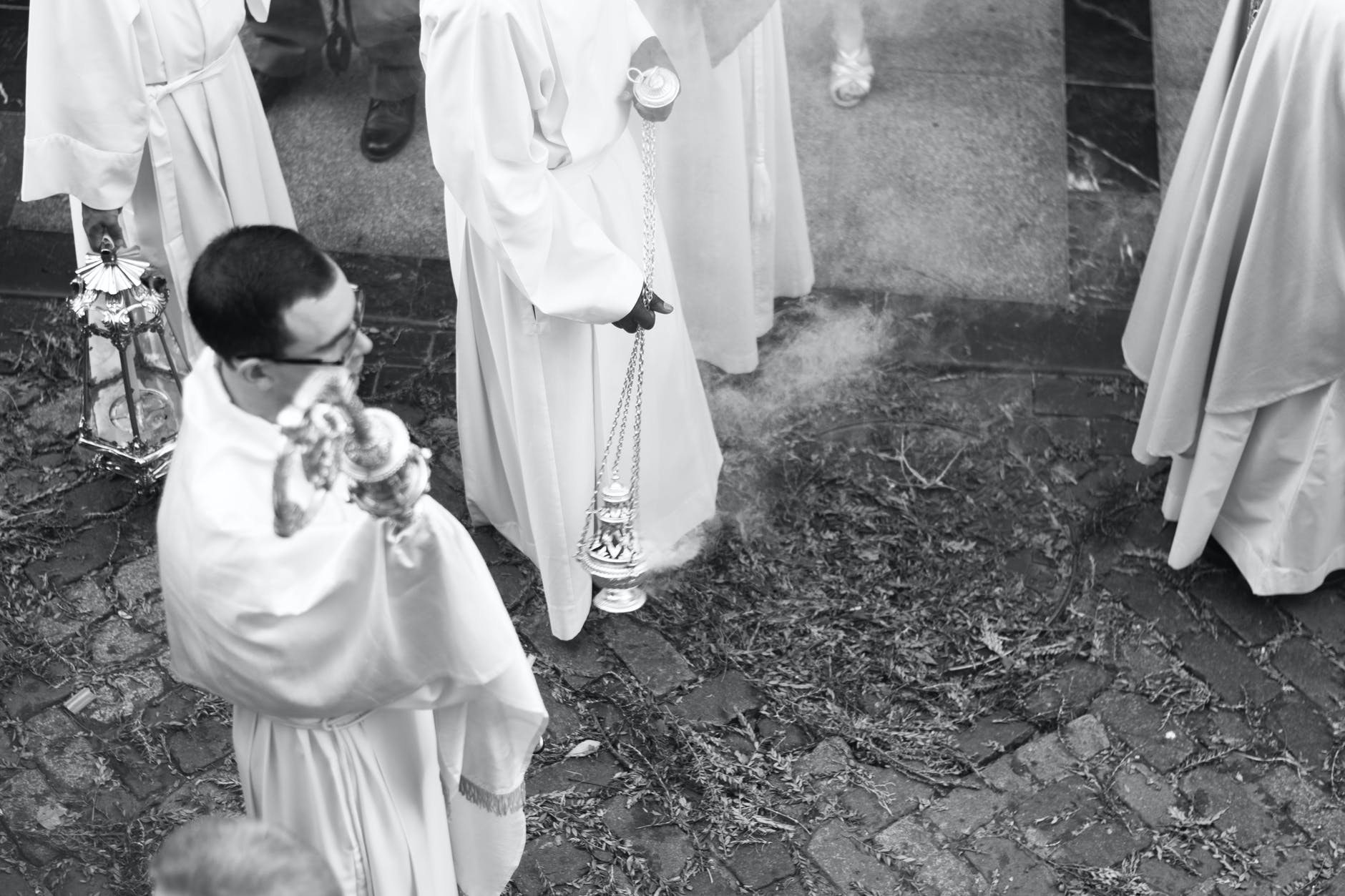
The faith of Christ makes us holy and humble.
Every external ethical standard will divide humanity into pretentious adherents and resentful violators. The gospel on the other hand is an internal standard that enables us to be holy and humble.

Every external ethical standard will divide humanity into pretentious adherents and resentful violators. The gospel on the other hand is an internal standard that enables us to be holy and humble.

We don’t like to be compelled or constrained. Something in humans will resist external control when we perceive it.1 We’ll even do things we don’t really want to do just because someone else has prohibited it. Take for instance the prevalence of tobacco use among teens2 despite its unpleasant taste and dysphoric effects.
Even as we buck perceived authority3 we fall under the sway of cultural conformity.4 Have you ever seen a rebellious teen smoking alone? We social animals instinctively know that without these controls, our societies will go off the rails. We desperately want to be free, but we don’t want to be alone. We need to be part of a society, but society can only function by inhibiting individual freedoms.
History catalogues governments and cultures formed and punctuated by coups and revolutions. Discontent builds beneath the confines of custom. Corruption corrodes credibility. Restless new generations aspire to recast society without their ancestors’ failings. When these tensions erupt they blow apart centuries-old conventions in a matter of months. These dynamics can be assumed from an historical viewpoint, but what happens next has spiritual implications.
Every revolution enthrones new oppressors. Yesterday’s edgy fashion trend becomes today’s cookie cutter look. Today’s social justice warrior will be tomorrow’s defender of the status quo.
The Who’s Pete Townsend penned some nearly-inspired lyrics about this phenomenon back in 1971:
There's nothing in the streets Looks any different to me And the slogans are replaced, by-the-bye And the parting on the left Is now parting on the right And the beards have all grown longer overnight5
More prosaically, the clear-eyed Saul Alinsky observed:
The Haves usually establish laws and judges devoted to maintaining the status quo; since any effective means of changing the status quo are usually illegal and/or unethical in the eyes of the establishment, Have-Nots, from the beginning of time, have been compelled to appeal to “a law higher than man-made law.” Then when the Have-Nots achieve success and become the Haves, they are in the position of trying to keep what they have and their morality shifts with their change of location in the power pattern.
Alinsky, Saul. Rules for Radicals (pp. 42-43)
To document this tendency, Alinsky cites two stirring examples. First, the anticlimax to Ghandi’s political and moral triumph over British colonial rule in India:
Eight months after securing independence, the Indian National Congress outlawed passive resistance and made it a crime. It was one thing for them to use the means of passive resistance against the previous Haves, but now in power they were going to ensure that this means would not be used against them!
Alinsky, Saul. Rules for Radicals (p. 43)
Then, Alinsky points his iconoclastic spotlight closer to home:
Again Sam Adams, the firebrand radical of the American Revolution, provides a clear example. Adams was foremost in proclaiming the right of revolution. However, following the success of the American Revolution it was the same Sam Adams who was foremost in demanding the execution of those Americans who participated in Shays’ Rebellion, charging that no one had a right to engage in revolution against us!
Alinsky, Saul. Rules for Radicals (p. 43)
All of this suggests that no matter how frequently or vigorously we shoot for freedom, our loaded dice turn up oppression. This perennial disparity seems to indicate something endemic within the human species. That we keep dismantling unjust regimes only to reinvent oppression suggests that we’re unaware of the real problem.
Jesus himself came resounding through the ages with the timeless promise, “you will know the truth, and the truth will set you free.”6 His church, tasked with dispensing that freedom, shortly became western civilization’s arch oppressor.7 Earthly kings might control their subjects’ actions, but only religious leaders can presume to lay claim on their hearts and minds. Politicians might put people to death for murder or treason, but priests execute them for what they believe.
Christendom didn’t create this kind of control; it just baptized it. Early believers in Christ had to defy the Roman imperial cult to confess that Jesus is Lord.8 Through this surrender to “the obedience of faith,”9 those first Christians rose above the reach of earthly authority. Then, the annexation of the church known as The Edict of Milan, paved the way for the persecuted to become the new persecutors.
Every religion, even historic Christianity, exists firmly within the world system and operates under the basic principles of control.
But Paul insisted that the gospel demands freedom.
It must be either that Paul had engineered a bait and switch or that the church has concocted a different gospel – one that conforms to human need for control. In this post, I plan to demonstrate that Paul’s gospel precluded human power dynamics at their root. This feature of the gospel argues strongly for its divine source.

Religious activities are almost always mediated through and witnessed by other people. This feature of religion makes it hard to know our own motives. Paul begins to probe into his own history with hypocrisy in Galatians 1:10-13:
For am I now seeking the approval of man, or of God? Or am I trying to please man? If I were still trying to please man, I would not be a servant of Christ. For I would have you know, brothers, that the gospel that was preached by me is not man’s gospel. For I did not receive it from any man, nor was I taught it, but I received it through a revelation of Jesus Christ. For you have heard of my former life in Judaism, how I persecuted the church of God violently and tried to destroy it.
(English Standard Version)
Paul assessed his own goals in writing the Galatian letter. Were his words borne out of obedience to God or a desire to please people? Was he protecting the establishment or was he functioning as God’s emissary?
We may wonder why Paul bothers to address such a possibility. Surely someone claiming to serve God must be aiming to serve God. But that’s not always the case.
In church staff meetings, I’ve heard Christian leaders say, “Everyone has mixed motives. It’s best just to do the right things and let your motives catch up.” Our ministries especially to youth intentionally employed man-pleasing. The goal was to have a youth leader who possessed enough “cool” factor to attract the popular kids. Then, he or she would train the popular kids to influence the rest of the group. Our senior pastor called it, “positive peer pressure.” To the question, “Are we pleasing human beings or God?” we probably would have responded, “Both.”
Paul doesn’t allow for such equivocation. He had to pick one because the two are antithetical – “If I were still trying to please people, I would not be a servant of Christ.”
If you’ve had only positive church experiences and can think back over a litany of mentors in your life, you might struggle to understand how this could be so. To appreciate Paul’s absolutist position, turn your attention to that little word, “still.” For Paul, this wasn’t an axiom like, “No one can serve two masters.”10 Galatians 1:10 is the beginning of his autobiography. Paul had to repent of his group loyalty before he could serve Christ.
We might expect this sort of assessment from a former gang member, but Paul hadn’t been a part of such an openly immoral group. Skip down to vs. 13a, “For you have heard of my previous way of life in Judaism…” Paul had been a citizen in Israel among God’s chosen people. In another place he gives his impressive religious pedigree:
If anyone else thinks he has reason for confidence in the flesh, I have more: circumcised on the eighth day, of the people of Israel, of the tribe of Benjamin, a Hebrew of Hebrews; as to the law, a Pharisee; as to zeal, a persecutor of the church; as to righteousness under the law, blameless.
Philippians 3:4b-6 (ESV)
How many people do you know who could call themselves, “blameless”? Before his conversion Paul had lived with complete integrity. His problem hadn’t been the law11 but the method of its enforcement. Even though he had zealously followed a religious code, he had ultimately been under the world system. The difference between Saul of Tarsus and Paul the Apostle wasn’t the God he claimed to serve, the values he espoused, or even his religious practice; it was in the influence other people had over his life.
Saul of Tarsus could not have become a follower of Christ because he, though highly religious, was the slave of human approval. His religious opinions and actions, as we will see, were shaped by his group rather than by a personal response to God. It has been said that when you mix politics and religion, you get politics. Paul would say that all religion is mixed. While the world’s power brokers artfully manipulate religious sensibilities, they recoil from the true gospel of God. Why? Because the kingdom which arises from its proclamation shimmers on a hill beyond their reach.
Here’s how Christ described his kingdom to a politician who was under political pressure from a bloc of power-mad priests:
Jesus said, ‘My kingdom is not of this world. If it were, my servants would fight to prevent my arrest by the Jewish leaders. But now my kingdom is from another place.’
John 18:36
God gave the Mosaic law, but he left its interpretation and enforcement to people. And people are fallen. True to form, these lawyers manipulated the law for their own gain.12 Power corrupts and corruption spreads. Manhandled religion breeds the kind of monumental hypocrisy that killed the Son of God. And so, Paul’s “previous way of life in Judaism” consisted of “intensely persecuting the church of God.”
Paul had followed the highest possible standard taught to him by the best possible mentors and became the worst possible sinner.13 His redemption could be nothing short of supernatural.
Back in verse 4, Paul wrote that he and the Galatians had both been saved from the same thing – this present evil age. But how could they both be saved from the same social environment when Jews and Gentiles maintained separate communities? The Jewish perception of the difference between the two communities can be seen in Paul’s own words to Peter in the next chapter:
We who are Jews by birth and not sinful Gentiles…
Galatians 2:15
First century Jews used the words, “sinners,” and “Gentiles,” interchangeably.
As a “Hebrew of Hebrews,” Paul probably thought the gentile Galatians needed to be saved from their society by joining his. His encounter with the living Jesus had shown him that he needed to be saved from his society as much as the Galatians needed to be saved from theirs.
How could this be when the two cultures looked so very different?
There’s a saying that goes, “If it looks like a duck, walks like a duck and quacks like a duck, then it just may be a duck.” While the logic may be questionable, the so-called duck test, often cuts through labels to practical realities. In this autobiographical section of Galatians, Paul cuts through the superficial distinctions between Jew and Gentile to show that everyone serves the same awkward water fowl. As with the metaphorical duck, the present evil age can be recognized by its patterns of behavior.
Consider how these patterns of social control manifested in Paul’s pre-Christian life as described in Galatians 1:13-14:
I’m sure this isn’t an exhaustive list, but it’s enough for us to assemble an accurate duck test to recognize that the present evil age operates in every relationship, family, friend group, organization, and nation. Every person in history was born under its domain because every social system operates on these dynamics. We may resent the oppression when we perceive it, but we’ll never be able to free ourselves because there’s no place to go.
Even if we could establish a free society, it would immediately begin to spoil. Why? Because in this world-wide prison, we’re not just the inmates; we’re also the wardens. Chances are, until this very moment, you’ve probably known these control tactics by their popular designation, “social skills.” They’re not just how we get used; they’re also how we get by. Like with trustees in a concentration camp we learn to survive by siding with our jailors. In time, our complicity wins us special favors which we come to treasure more than our own souls.

Paul’s description of his previous way of life under Judaism looks pretty hopeless. He was an enemy of God and humankind while finding human approval and professing to serve God. The only hope there could be for such a deluded individual comes in his next three words to the Galatians, “But when God…” As with Israel in Egypt, only God could bring Paul and the Galatians out of slavery. This time, though, the Lord’s mighty hand would bring his people out from under the invisible lash of social control.
Let’s consider Galatians 1:15-17 phrase by phrase to see how God’s action through Christ liberates everyone who believes:
Paul fled to the desert after his conversion, but the desert wasn’t his destination. At the end of Galatians 1:17 he tells his readers, “Later I returned to Damascus.”
I don’t know how long Paul stayed in Arabia, but it probably wasn’t more than a few weeks. Luke, Paul’s biographer, reports Paul’s conversion and his ministry in Damascus contiguously in Acts 9:17-22.
The gospel doesn’t call us to abandon the world. Any old ascetic cult can do that. The gospel calls and empowers us to live free from human influence as an open community in the midst of this present evil world.
All of this may sound wonderful, but it’s also frightening. As members of the present evil age, we not only were compelled by these methods of control, we counted on them. To be freed from them, we’ve been stripped of them. Interacting with other people can feel like being sent unarmed into an active combat zone. In fact, that’s what it is –
“I am sending you out like sheep among wolves.”
-Jesus22
You know what happens to sheep among wolves, don’t you? There’s nothing in Scripture or Christian history to suggest any exception to the usual outcome. Christ died to set us free. We too, must die to our illusions, affections, ambitions, allegiances, expectations, and even existence on this planet if we’re going to remain free. This is why humans while clamoring to be free, secretly hate radical freedom and would never think to release it upon the world.
For I would have you know, brothers, that the gospel that was preached by me is not man’s gospel. For I did not receive it from any man, nor was I taught it, but I received it through a revelation of Jesus Christ.
Galatians 1:11-12
Yes, Paul received his gospel through a supernatural event, but the message he received was the exact one he passed on. The revelation was “of Jesus Christ.” Paul wasn’t given a list of moral imperatives, a sacramental system, or an ecclesiastic order. He never claimed to be commissioned to write The Bible: Volume Two. The message he got from Christ was, “I’m alive.”
Even now when the gospel is preached only the called will hear directly from Christ. What they will hear will be the same revelation given to Paul. From that moment on, they will all be taught of God.